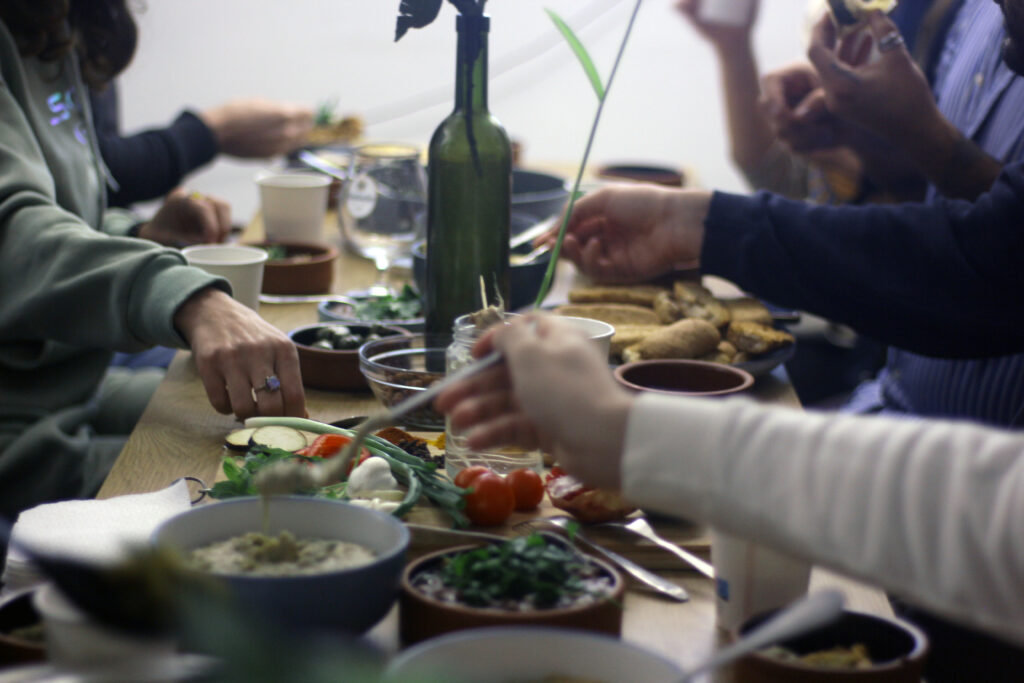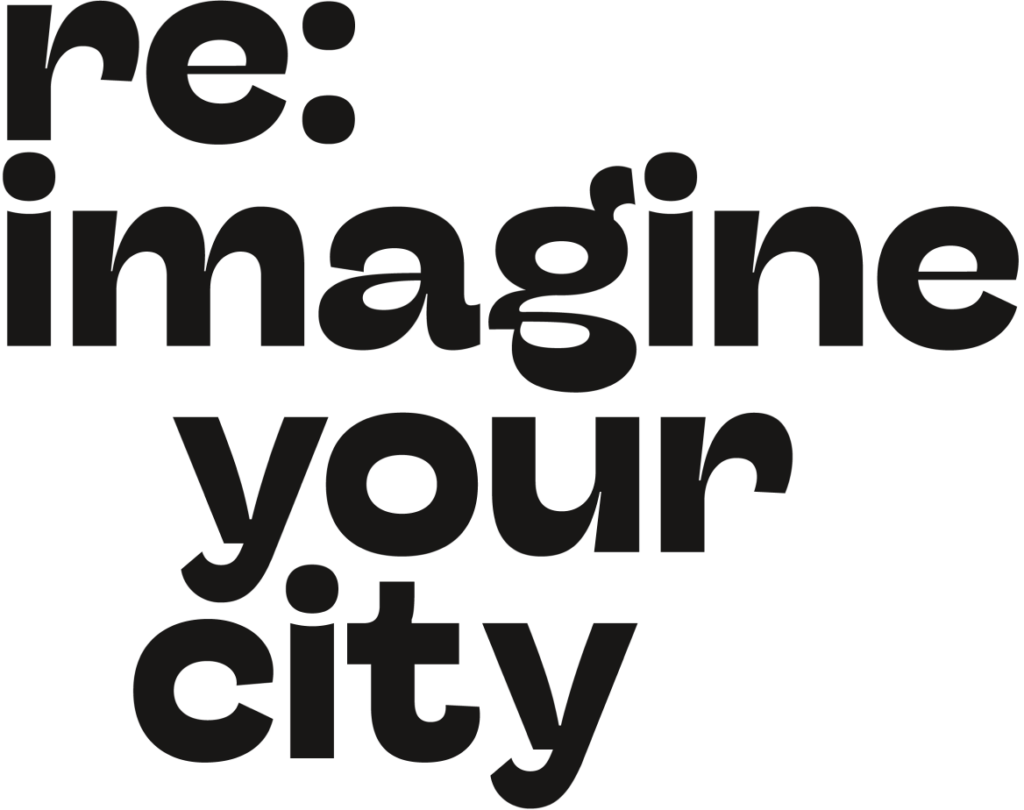Last September, reimagine your city team went to the Europe Lab 2023 in the Netherlands, a social laboratory and networking programme on the topic of the legacy of colonialism in Eastern and Western Europe, organised by Civil Society Forum. As a result, we connected with other inspiring participants and developed a series of events, uniting our interest in postcolonial movements and passion for food.
The “Post-Colonial Food Talks & Walks” contextualizes a broad concept of colonialism in a tangible and material way, in localized settings using formats of community dinners and food walks as an entry point, and methodology. Here you can read about outcomes and instructions on how to organise such walks and dinner conversations in your cities.
Food Walk: Orient Station
Berlin, November 19, 2023
We went on an explorative food walk through Wedding, Berlin with artist and researcher Marina Resende Santos, followed by a discussion and an experimental degustation.
During the walk, our group observed and analyzed social spaces shaped by hybrid encounters and neocolonialism near Gesundbrunnen. This included supermarkets, squares, ‘migrant’ shops, and bakeries. Our journey commenced with a visit to an organic supermarket, where handouts with questions and tasks guided us through the experience. We continued with tasting a Berliner at Thoben, enjoying a fresh Simit at La Femme, and concluded at the Hopscotch Reading Room event space for a discussion and preparation of food using ‘exotic’ products acquired from supermarket chains.
read more
One notable observation during the walk was the highly structured nature of the supermarket. It is a meticulously designed space, intended for people to navigate in a specific manner through the aisles. Any behavior deviating from the typical stroll can be perceived as suspicious, even as simple as standing around and jotting down notes. Another aspect we noticed was the varying pace of shoppers. Some moved slowly, contemplating each item in the aisle, while others rushed through, seemingly on a quick mission—perhaps just grabbing a single item or taking advantage of the fact that this particular supermarket was the only one open at that moment. This led some participants to reflect on the economic aspect of the situation and consider how the dynamics might differ on a weekday.
Another reflection was about the origins of food. “As I gazed at the shelves, I couldn’t help but ponder what items wouldn’t be here without colonialism.” It triggered thoughts about the systemic impact of labor tied to colonialism. The context is particularly intriguing as we were in Wedding, often referred to as ‘Red Wedding,’ a working-class district with a significant population of Turkish immigrants who arrived in the ’70s. Someone remembered a YouTube video showing a German supermarket Edeka removed all products not originating from Germany or Europe from the shelves. In one instance, a sales assistant mentioned there was no coffee, tea, or chocolate, to which a customer responded with surprise about the absence of chocolate. The sales assistant confirmed the absence. Edeka had jumped on this story themselves by using the concept of diversity. The irony lies in Edeka’s historical roots. It was founded in 1898 as “Einkaufsgenossenschaft der Kolonialwarenhändler” (shortly E. d. K.), translating to the Purchasing Cooperative of Colonial Goods Retailers. The company kept the name despite the protests from its own employees.
Orientalism and the marketing of ‘exotic’ foods in supermarkets have undergone interesting changes in recent years. This shift is noteworthy as there has been a move away from generic labels like “oriental taste.” For example, the recent rebranding of fruit teas by Mezzmo involves assigning country designations to all their products. Instead of using the term “oriental,” they now label products as “Egyptian mint” and other geographical designations like “French blonde hair”. This rebranding serves as a reaction to potential criticism, highlighting the ongoing sensitivity around cultural and regional distinctions. They draw attention to the similarity in packaging for Egyptian and Persian pomegranate tea, suggesting that the branding may not truly honor specific traditions or origins. Other contested examples are tea brands named after Lord Nelson and Captain Cook. During the seminar on postcoloniality, one of the groups placed stickers with QR codes on the tea packaging. The codes led to protests against figures like Lord Nelson in Barbados and Captain Cook in Australia, emphasizing the ongoing debate about colonialist figures and statues.
Another striking observation evolved around the accessibility and availability of organic food.
“I would consider going there only if there’s some special offer? It aligns with the concept of associating quality food with money. There’s a connection between these two aspects. However, simultaneously, I find myself thinking that I cannot afford to do my shopping there. Witnessing so many supposedly good products priced so high makes me reflect on the privilege that some people have, or that I would have if I had more financial resources” said one participant.
In relation to this issue, fair trade and the entire labeling system emerged as one of the central topics of our discussion. These labels aim to assure consumers that the product is responding to concerns about potential unfair labor conditions. By choosing products with such labels, consumers express a commitment to equality, even if it often comes at a higher price. This can evoke centuries-old frustration, as the desire to consume ethically may be there, but the accessibility may not.
“I’m also reflecting on my shopping habits, thinking about the people behind the products. Yes, it’s labeled as organic, but how does it impact the individuals working for it? Even when we place a certification label on something, it involves a level of belief, assuming that what we are told is accurate, without knowing precisely if it is.”
An example illustrating this point is an initiative in Brazil introducing locally produced food into kindergartens. The requirement is that 50% of the food in kindergartens must come from small agricultural plots in the vicinity highlighting the importance of supportive laws and regulations. The Brazilian case ties back to issues of land distribution and supports the fight for quality food by small farmers who may be working on land historically claimed by larger landowners. The struggle for justice also aims to provide small farmers with dedicated markets, including all public schools. This commitment ensures that their products find a market and are purchased, preventing them from being priced higher or having shorter shelf lives due to longer transport distances. The root cause of the distribution issue in Brazil, with a few large landowners dominating land use for crops like soy, maize, and sugarcane, can be traced back to the historical legacy of colonialism and continues to be a manifestation of neocolonial practices.
In the European context, two conflicting goals arise. First is the desire for local and regional consumption to reduce carbon emissions and uphold strong labor laws. At the same time, there are still products that have to be produced in warmer regions like coffee, tea, chocolate, and bananas, all four typical colonial products. Fairtrade emerges as a direct response to colonialism and the desire to address labor abuses in these global supply chains. Originally born from charity shops, Fairtrade evolved into a certification label that attempts to ensure fair labor conditions, particularly for workers in cooperatives.
However, the question of who controls and makes the rules is crucial. Following strict Fairtrade rules from Europe may not always align with local social structures. The negotiation of certification rules is an ongoing process influenced by the sensibilities of certifiers, while alternative certifications from the Global South are seeking legitimacy within the Fairtrade framework.
We encourage you to organize such a walk in your city — you can do it alone or with a couple of your friends and colleagues. Download this guide to lead you through a supermarket, a market or a place of your choice.
Decolonial Dinner
Tirana
read more
details coming
The project is implemented as part of the Europe Lab 2023 and supported by Civil Society Forum.



